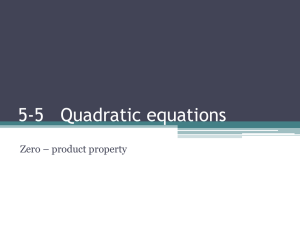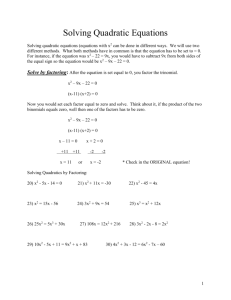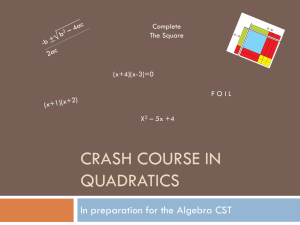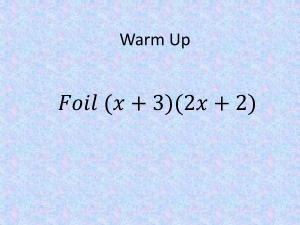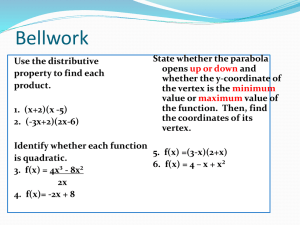Solving Quadratic Equations
advertisement
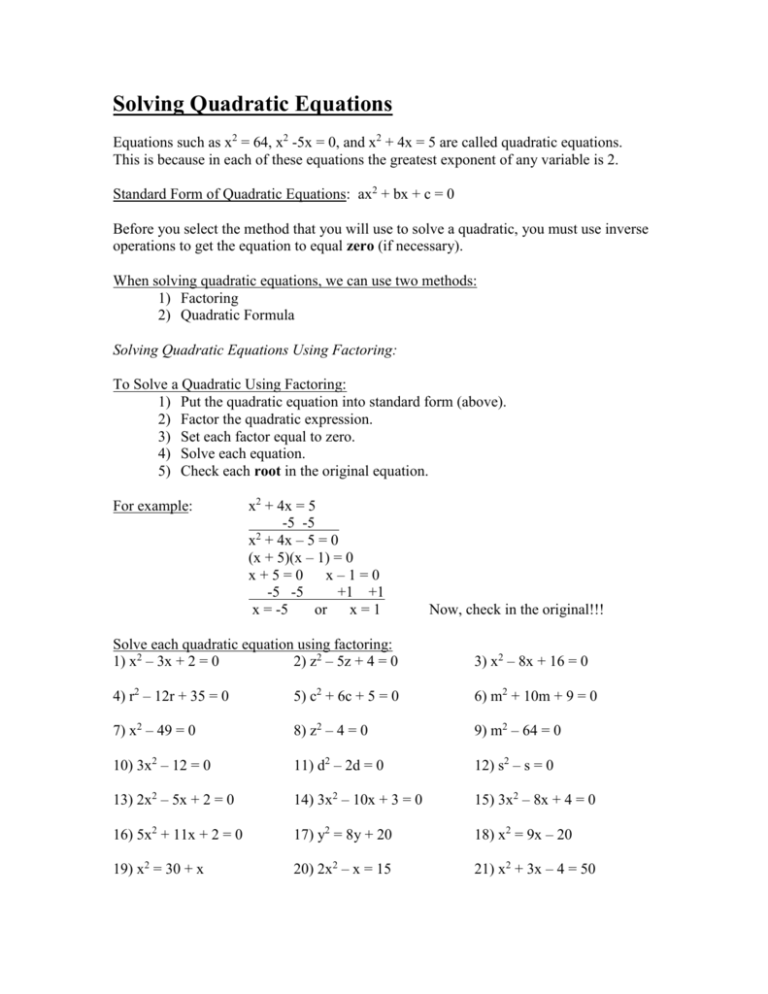
Solving Quadratic Equations Equations such as x2 = 64, x2 -5x = 0, and x2 + 4x = 5 are called quadratic equations. This is because in each of these equations the greatest exponent of any variable is 2. Standard Form of Quadratic Equations: ax2 + bx + c = 0 Before you select the method that you will use to solve a quadratic, you must use inverse operations to get the equation to equal zero (if necessary). When solving quadratic equations, we can use two methods: 1) Factoring 2) Quadratic Formula Solving Quadratic Equations Using Factoring: To Solve a Quadratic Using Factoring: 1) Put the quadratic equation into standard form (above). 2) Factor the quadratic expression. 3) Set each factor equal to zero. 4) Solve each equation. 5) Check each root in the original equation. For example: x2 + 4x = 5 -5 -5 x2 + 4x – 5 = 0 (x + 5)(x – 1) = 0 x+5=0 x–1=0 -5 -5 +1 +1 x = -5 or x = 1 Now, check in the original!!! Solve each quadratic equation using factoring: 1) x2 – 3x + 2 = 0 2) z2 – 5z + 4 = 0 3) x2 – 8x + 16 = 0 4) r2 – 12r + 35 = 0 5) c2 + 6c + 5 = 0 6) m2 + 10m + 9 = 0 7) x2 – 49 = 0 8) z2 – 4 = 0 9) m2 – 64 = 0 10) 3x2 – 12 = 0 11) d2 – 2d = 0 12) s2 – s = 0 13) 2x2 – 5x + 2 = 0 14) 3x2 – 10x + 3 = 0 15) 3x2 – 8x + 4 = 0 16) 5x2 + 11x + 2 = 0 17) y2 = 8y + 20 18) x2 = 9x – 20 19) x2 = 30 + x 20) 2x2 – x = 15 21) x2 + 3x – 4 = 50 22) 2x2 + 7 = 5 – 5x 23) x(x – 2) = 35 24) y(y – 3) = 4 25) x + 2 = 12 2 x 26) y + 3 = 6 3 y 27) x = 12 3 x 28) 10x2 – 5x + 11 = 9x2 + x + 83 29) 4x2 + 3x – 12 = 6x2 – 7x – 60 Solving Quadratics Using the Quadratic Formula: Not every quadratic equation can be solved by factoring. In this case, we need to use the quadratic formula. Quadratic Formula: x = - (b) ± √b2 – 4ac 2a To Solve a Quadratic Using the Quadratic Formula: 1) Put the quadratic equation into standard form (above). 2) Write out the formula and what a, b, & c stand for. 3) Substitute for each variable. 4) Split into two separate equations (setting each equal to zero) and solve. 5) Check each root in the original equation. For example: a = 2, b = 1, c = -6 2x2 + x = 6 -6 -6 2x2 + x – 6 = 0 ***Can’t be factored, use the formula. x = - (b) ± √b2 – 4ac 2a x = - (1) ± √(1)2 – 4(2)(-6) 2(2) x = -1 ± √1 +48 4 x = -1 ± √49 4 x = -1 ± 7 4 x = -1 + 7 4 x = -1 – 7 4 x= 6 4 x = -8 4 x= 3 2 x = -2 *** Now check in original equation! *** Note: If you get a decimal for your answer, follow the directions, or round to 4 decimal places!!! Solve each equation using the quadratic formula: 1) x2 - 7x + 6 = 0 2) x2 + 4x – 5 = 0 3) x2 + 3x + 2 = 0 4) 2x2 + x – 1 = 0 5) 3x2 + 5x + 2 = 0 6) 3x2 + 5x + 2 = 0 7) x2 + 6x + 9 = 0 8) 4x2 – 4x + 1 = 0 9) x2 + 10x = -25 10) x2 + x = 12 11) x2 + 2x = 24 12) x2 = x + 2 13) x2 + 8 = 6x 14) 2x2 – 10 = x 15) x2 – 9 = 0 16) 5x2 = 20 17) x2 – 3x + 1 = 1 18) x2 = 5x 19) x2 – 2x – 2 = 0 20) x2 – 10x + 4 = 0 21) x2 + 2x – 4 = 0 22) x2 – 2 = 4x 23) 2x2 – 8x + 7 = 0 24) 4x2 = 2x + 1 For each of the following, figure out which type of equation you have been given, then choose the best method to solve. Do not forget to check! 1) 20 – (5/8)x = 40 2) 6(7x – 2) = 8(4x + 1) 3) 2(5x – 4) – 3(4x + 3) = -43 4) x2 + 44 = 15x 5) 3x2 + 18x = 81 6) 3x2 = 5x + 5 7) 11x – 5 = 7x – 53 8) 6(3x + 1) + 5(10 – 4x) = 39 9) ¼x – 33 = -49 10) 7x2 – 1 = 3x 12) 15x = x2 – 16 13) x2 + 8x = 12 11) 9(3x + 1) = 8(5x + 6) 14) 9(4x + 7) – 6(7x + 10) = -54 15) 44 = 20 – 2x 16) 4x2 – 128 = 16x 18) 7(6x + 2) = 10(3x + 5) 17) 3x2 – 8x + 6 = x + 6 19) 3x2 + 13x – 12 = 9x2 – 11x – 12 20) 2x2 – 14 = 10x
